This week, read about recipes for runners, healthy snacks predicting grocery shopping purchases, why you should listen to your coach, diet and cancer risk, the importance of distributing protein intake, pros and cons of marathons vs 5k’s, the myth of endurance training causing loss of speed, food sources of iron, how runners can overcome carbophobia, and more.
Swap your diet, swap your cancer risk, new study finds
A dramatic change in diet can have a marked influence on health, according to this new study. Researchers asked 20 African Americans and 20 South Africans to adopt the typical diet of the other country. The diets could be broadly categorized as follows: the American diet was higher animal protein and fat and low in fiber, and the South African diet was lower animal protein and fat and high in fiber (about 4 times the fiber of the American diet). Adopting these diets for 2 weeks produced marked changes in gut microbes: microbes of those eating the American diet had characteristics known to increase colon cancer risk. This study adds to a growing body of research showing that our gut microbes influence our health, and that what we eat influences our gut microbes. (Forbes, reporting on Nature Communications, April 28, 2015).
This finding supports other studies showing that diet can play an important role in colon cancer risk. The evidence shows that high-fiber foods lower risk, while red and processed meats increase risk. Summaries of research estimate that 50% of US colorectal cancers could be prevented by healthy eating, being physical active, and maintaining a healthy weight.
Another recent study showed fiber’s benefits for weight loss. Most high-fiber diets are based on plant foods (vegetables, fruits, beans/legumes, and whole grains). These foods are naturally low in fat and sugar. As with other healthful foods, the health benefit may not be because of some special nutrient the food contains, but the entire package of nutrients in the food (vitamins, minerals, protective phytochemicals). This diagram shows you healthy ways to increase our fiber intake.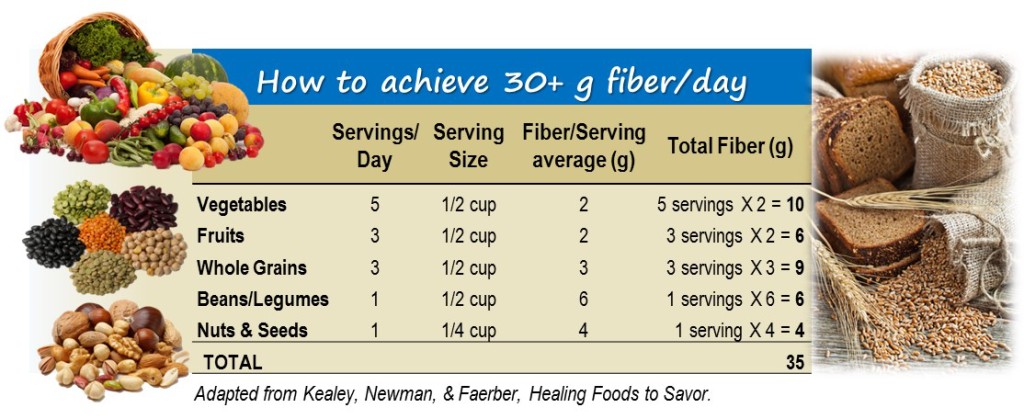
More Links of Interest This Week
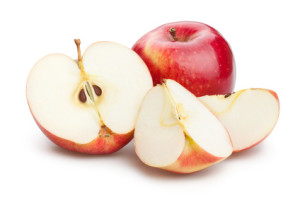 A good reason to have a healthy snack before grocery shopping. A new paper by Cornell Food and Brand Lab researchers found that what you eat before grocery shopping can influence your food choices. In a series of studies, they found that eating something healthy (an apple slice) before grocery shopping primed shoppers to make healthier food choices, but eating something unhealthy (cookies) encouraged unhealthy food choices. (Psychology & Marketing, April 2015). Something to think about when food sampling while grocery shopping!
A good reason to have a healthy snack before grocery shopping. A new paper by Cornell Food and Brand Lab researchers found that what you eat before grocery shopping can influence your food choices. In a series of studies, they found that eating something healthy (an apple slice) before grocery shopping primed shoppers to make healthier food choices, but eating something unhealthy (cookies) encouraged unhealthy food choices. (Psychology & Marketing, April 2015). Something to think about when food sampling while grocery shopping!
Why You Should Listen to Your Coach. The great storytelling and usual excellent advice of runner Lauren Fleshman. (Runner’s World)
This pastry chef wants you to eat fewer sweets. Is that treat really #dessertworthy? This is a healthy eating philosophy – you don’t have to banish desserts or sugar, just eat them in appropriate portions and savour them. Emily Luchetti, an esteemed pastry chef, launched #dessertworthy, a social media campaign on twitter and instagram “to remind people that sweets should be savored, appreciated, and eaten with care.” (Time)
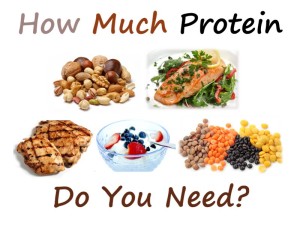 The health benefits of balancing protein intake throughout the day. A review of the studies on protein intake and health adds to the evidence showing that distributing protein intake throughout the day benefits health. (American Journal of Clinical Nutrition, April 29, 2015)
The health benefits of balancing protein intake throughout the day. A review of the studies on protein intake and health adds to the evidence showing that distributing protein intake throughout the day benefits health. (American Journal of Clinical Nutrition, April 29, 2015)
Are you getting enough protein? And do you know how much you need for your weight and activity level? Check out my article How Much Protein Do You Need.
Pros & con’s of running marathons vs 5k’s. 5k’s look pretty good to me! The article links to some pretty good-looking 5 k workouts. (Lauren Fleshman)
Saturated fatty acids might directly damage heart. Saturated fatty acids are predominant in animal fats (meat, full fat dairy), while most plant-based fats are polyunsaturated fatty acids. This study examined the influence of both types of fatty acids on heart cells, and found that unsaturated fatty acids were protective, while saturated fatty acids were toxic to cells. Saturated fat is implicated in heart disease, and this study might help explain some of the mechanisms involved. (Endoplasmic Reticulum Stress in Diseases, March 2015)
The myth of losing speed. Running coach Steve Magness talks about the delicate balance speed vs endurance training. (The Science of Running)
How I got converted to GMO Food. Interesting perspective from a former anti-GMO activist. (New York Times)
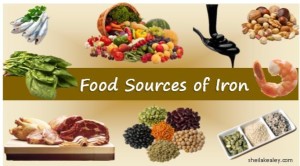 Are you trying to add more iron to your diet? Studies show that many teens and women don’t consume enough iron-containing foods, and this is an important contributor to iron deficiency. Knowing which foods contain iron and the best ways to absorb the iron can make a big difference. This article will let you know how much iron you need, and the best ways to get iron from your diet.
Are you trying to add more iron to your diet? Studies show that many teens and women don’t consume enough iron-containing foods, and this is an important contributor to iron deficiency. Knowing which foods contain iron and the best ways to absorb the iron can make a big difference. This article will let you know how much iron you need, and the best ways to get iron from your diet.
For teenagers, potassium may matter more than salt. A new study published this week shows that a potassium-rich diet protected teens from high blood pressure compared to a low-salt diet. Good sources of potassium include fruits, vegetables, legumes, fish, and dairy. (New York Times, reporting on JAMA Pediatrics, April 27, 2015)
How runners can overcome ‘carbophobia’. This is a great article explaining that you can’t lump all carbohydrates into one category and call them evil (i.e., jelly beans aren’t the same as steel-cut oats). You don’t need to avoid carbohydrates, just choose your sources carefully. (Matt Fitzgerald)
People don’t know what’s healthy. Many companies are changing their ingredients based on consumer anxieties that aren’t backed by science. Too bad consumers aren’t spending more time pressuring food companies to do things that would improve health. As Olga Khazan of the Atlantic writes:
If consumers really wanted to make packaged food healthier, they could pressure snack companies to produce smaller portions, or to not market so aggressively to children. (The Atlantic)
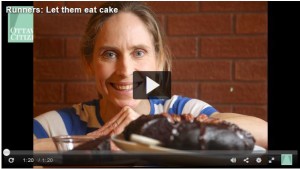 Let them eat cake: recipes for runners.
Let them eat cake: recipes for runners.
I made my Chocolate Beet Cake for an Ottawa Citizen feature on recipes for runners for the upcoming Ottawa Race Weekend. In the video I discuss the research on dietary nitrates, sports performance, and health, and other sources of nitrates in addition to beets.